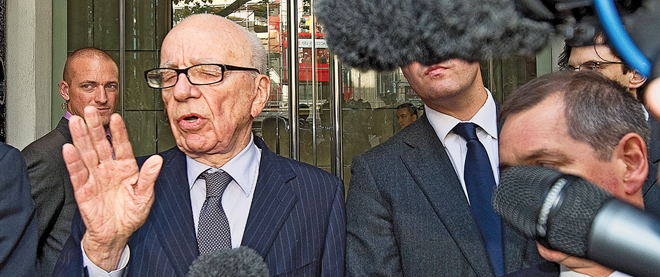Rupert Murdoch, tabloids, and me
Barbara Amiel on the Sun King’s alternate universe
Share

What’s your favourite tabloid headline? How about “Kill an Argie and win a mini Metro” at the time of the 1982 Falklands War? That was a spoof of Rupert Murdoch’s tabloid Sun by Private Eye and can’t be outdone. But the Sun’s front-page “Bloody frogs scuttle our hols” at the time of a French workers’ ferry strike before the Chunnel train was built was legit. Horrid but brilliant.
I’ve been having a few tabloid moments, in the name of research of course. “Years of crash diets left me infertile, says reality TV star Chantelle Houghton,” photographed in this week’s Daily Mail. Name doesn’t ring bells? She’s 27. She drank up to eight 1.5-litre bottles of water a day to fill her stomach, and her periods once stopped for a year, in case you’re interested. At age 27 I never had more than one period a year and that didn’t interest even me, but then I wasn’t Channel 4’s first non-celebrity ex-reality-show star who was finding life after stardom “difficult.” Chantelle wants to help other women who may be drinking too much water, like gorgeous but aquaholic TV chef Nigella Lawson. See, you read that entire paragraph. It’s junk, but mesmerizing.
Since everyone is dissing tabloids in the wake of the great phone-hacking scandal, I might as well. After all, I have edited a tabloid (Toronto Sun), written for a tabloid (the National Enquirer), been the subject of tabloids ad nauseam, and worked for two of Mr. Murdoch’s London newspapers including the Sunday Times, now drawn into the scandal. This is more qualification than any hackette needs for an instant book.
I’m not going to speculate who knew about the hacking, even though I probably should ask Scotland Yard if Conrad’s name is on the hackers’ list. The problem with all this outraged noise is that readers beyond the London loop have no idea how predictable, almost ordinary, this is.
Newspapers occupy a place in Britain never duplicated in North America. Working for a powerful Murdoch tabloid meant you lived in an alternate universe insulated from reality. Every door opened to you. Governments believed fervently they could be made or broken by the Murdoch press. The British royal family acted as if only Murdochland stood between them and the guillotine. No matter Rupert was an anti-monarchist whose papers attacked the royals mercilessly; his were the ones the royals chose first when excerpting their books or giving an interview. Stockholm syndrome. No matter how nasty his tabloids, everyone took it and licked boots—including sanctimonious journalists at competing publications who thought, perfectly reasonably, that one day they might be working for Murdoch given he was taking over everything. In that exotic power-perfumed atmosphere, breaking some rule to get a scoop must have seemed natural rather than criminal and foolhardy to eschew. Police complicity? Well, when you are the Sun King, everyone comes to your court—even more so if you are Lord of the Dark Arts, splashing money.
No $500 jar of cream could get you the aura and nothing could equal the nexus of politics, business and society that the Murdoch empire could muster. Each year your place in the hierarchy was validated by attending one of the lavish parties: this year Murdoch’s June 16 bash at Kensington Palace’s Orangery, or Elisabeth Murdoch’s July 2 all-night splash at her Cotswold home. Prime ministers, princes of business and state—even politicos hacked by Murdoch’s press, like Labour’s Tessa Jowell, turned up. A journalist could make invaluable contacts. How could such a world fail to be a petri dish for corruption? And it’s unlikely that the other tabloids refrained from dirty methods in order to compete. I’ll wager most Canadian journalists would behave no better in this galaxy than their British counterparts. And if readers slag this off with smug little comments about this reflecting my rotten character so be it.
Historically, this era probably began with Murdoch’s takeover of the Sun in 1969 and the genius of Kelvin MacKenzie, his favourite editor, appointed in 1981. Earlier tabloid journalism had distinguished moments. It started as the “new journalism” in the 19th century and was a sensational mix that reported on real issues up to postwar Britain. If you haven’t read American journo Nellie Bly’s Ten Days in a Mad-House please do. In 1887, at great physical risk to herself, Bly feigned insanity and got herself committed to the infamous asylum on Blackwell’s Island. The resulting series in New York’s World was a sensation. This was the era of “girl stunt reporters” (see Jean Marie Lutes’s book Front Page Girls) when women didn’t have to be page-three girls sans tops to be tabloid hits.
Today’s U.K. tabloid press is a loathsome distortion. Chequebook journalism is the other prop of the phone hackers. My mother, stroke-ridden, emotionally fraught and in her eighties, a woman I had seen about once in 40 years, was set upon in her Ontario home by a chequebook-waving British tabloid reporter and told muck about me giving interviews to London papers blaming the troubles of my husband and myself on her. The resulting story was painful to read. Shortly before he died, my stepfather, an honourable man, wrote an apologetic letter explaining how the reporter put them under siege.
Neither press legislation nor regulation should or can cure this syndrome. Criminal law for crimes committed, yes, but essentially the problem is self-correcting: dethrone the king and his court is powerless. News Corp. may remember Humpty, the large cannon placed on a wall in the 17th-century English Civil War: “Humpty Dumpty sat on a wall / Humpty Dumpty had a great fall / All the king’s horses and all the king’s men /couldn’t put Humpty together again.” RIP.